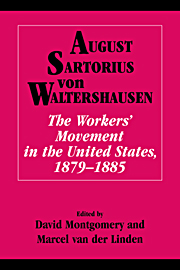Book contents
- Front Matter
- Contents
- Acknowledgments
- 1 Introduction
- 2 August Sartorius von Waltershausen (1852–1938), German Political Economy, and American Labor
- 3 The Trade Unions in the United States of America
- 4 Boycotts: A New Trade Union Weapon in the United States
- 5 Relief Funds in the United States
- 6 Bibliography of Sartorius von Waltershausen's Writings
- Index
2 - August Sartorius von Waltershausen (1852–1938), German Political Economy, and American Labor
Published online by Cambridge University Press: 22 September 2009
- Front Matter
- Contents
- Acknowledgments
- 1 Introduction
- 2 August Sartorius von Waltershausen (1852–1938), German Political Economy, and American Labor
- 3 The Trade Unions in the United States of America
- 4 Boycotts: A New Trade Union Weapon in the United States
- 5 Relief Funds in the United States
- 6 Bibliography of Sartorius von Waltershausen's Writings
- Index
Summary
In 1892 economist Wilhelm Lexis prepared a two-volume compendium of German universities for Chicago's Columbian Exposition, part of Germany's elaborate preparations for a triumphant return to the international competition of world's fairs after an unimpressive showing at the last American world's fair in Philadelphia in 1876. German academic interest in the United States owed its inspiration to “the astounding economic blossoming of America” in the years since the Civil War, Lexis maintained. Among the handful of experts whose work on American themes Lexis celebrated, the most prominent economist was a comparatively young University of Strasbourg professor named August Sartorius von Waltershausen. Lexis listed the professor's main research areas as trade unionism and the socialist movement in the United States, but he was also an expert on American immigration, trade and commerce, and the German-American community.
The roots of the Strasbourg economist's interest in American labor and the working class originated in the Old World, not the New. Like all advanced capitalist economies in the late nineteenth century, Germany wrestled with class warfare as Bismarck pioneered the carrot and-stick approach of banning the Social Democratic Party and offering social welfare programs to win the allegiance of the workers. Bismarck's policies had proven powerless to prevent the mass strikes of Ruhr coal miners in 1889 or the electoral success of the Social Democrats in the 1890 Reichstag election when they won the support nearly 20 percent of the electorate.
- Type
- Chapter
- Information
- The Workers' Movement in the United States, 1879–1885 , pp. 28 - 64Publisher: Cambridge University PressPrint publication year: 1998

